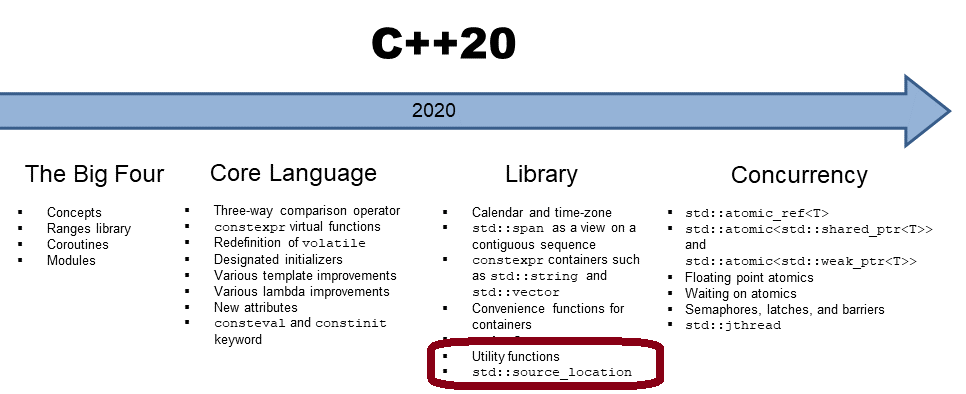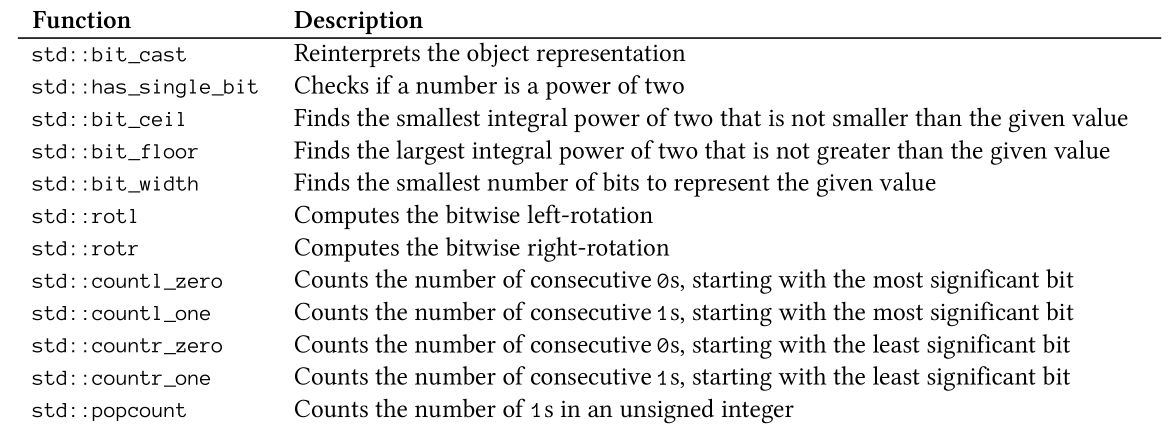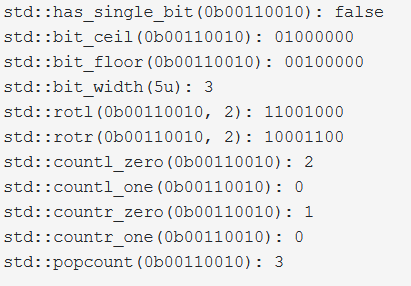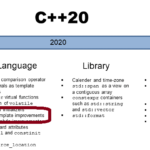Bit Manipulation with C++20
This post concludes my presentation of library features in C++20. Today I am writing about the class std::source_location and a few functions for bit manipulation.

std::source_location
std::source_location represents information about the source code. This information includes file names, line numbers, and function names. The information is precious when you need information about the call site for debugging, logging, or testing purposes. The class std::source_location is the better alternative for the predefined C++11 macros __FILE__ and __LINE__ and should, therefore, be used.
The following table shows the interface of std::source_location.

The call std::source_location::current() creates a new source location object src. src represents the information of the call site. Now, no C++ compiler supports std::source_location. Consequently, the following program sourceLocation.cpp is from cppreference.com/source_location.
// sourceLocation.cpp // from cppreference.com #include <iostream> #include <string_view> #include <source_location> void log(std::string_view message, const std::source_location& location = std::source_location::current()) { std::cout << "info:" << location.file_name() << ':' << location.line() << ' ' << message << '\n'; } int main() { log("Hello world!"); // info:main.cpp:19 Hello world! }
The output of the program is part of its source code.
C++20 makes it quite comfortable to access or manipulate bits or bit sequences.
 Modernes C++ Mentoring
Modernes C++ Mentoring
Do you want to stay informed: Subscribe.
Bit Manipulation
Thanks to the new type std::endian, you get the endianness of a scalar type.
Endianness
- Endianness can be big-endian or little-endian. Big-endian means the most significant byte comes first; little-endian means that the least significant byte comes first.
- A scalar type is either an arithmetic type, an
enum, a pointer, a member pointer, or astd::nullptr_t.
The class endian provides the endianness of all scalar types:
enum class endian { little = /*implementation-defined*/, big = /*implementation-defined*/, native = /*implementation-defined*/ };
- If all scalar types are little-endian,
std::endian::nativeis equal tostd::endian::little. - If all scalar types are big-endian,
std::endian::nativeis equalto std::endian::big.
Even corner cases are supported:
- If all scalar types have
sizeof1 and therefore endianness does not matter; the values of the enumeratorsstd::endian::little,std::endian::big, andstd::endian::nativeare identical. - If the platform uses mixed endianness,
std::endian::nativeis neither equal tostd::endian::bignorstd::endian::little.
When I perform the following program getEndianness.cpp on an x86 architecture, I get the answer little-endian.
// getEndianness.cpp #include <bit> #include <iostream> int main() { if constexpr (std::endian::native == std::endian::big) { std::cout << "big-endian" << '\n'; } else if constexpr (std::endian::native == std::endian::little) { std::cout << "little-endian" << '\n'; // little-endian } }
constexpr if enables it to compile source code conditionally. This means that the compilation depends on the endianness of your architecture. If you want to know more about endianness, read the same-named Wikipedia page.Accessing or Manipulating Bits or Bit Sequences
The following table gives you the first overview of all functions.

The functions except std::bit_cast require an unsigned integer type (unsigned char, unsigned short, unsigned int, unsigned long, or unsigned long long).
The program bit.cpp shows the usage of the functions.
// bit.cpp #include <bit> #include <bitset> #include <iostream> int main() { std::uint8_t num= 0b00110010; std::cout << std::boolalpha; std::cout << "std::has_single_bit(0b00110010): " << std::has_single_bit(num) << '\n'; std::cout << "std::bit_ceil(0b00110010): " << std::bitset<8>(std::bit_ceil(num)) << '\n'; std::cout << "std::bit_floor(0b00110010): " << std::bitset<8>(std::bit_floor(num)) << '\n'; std::cout << "std::bit_width(5u): " << std::bit_width(5u) << '\n'; std::cout << "std::rotl(0b00110010, 2): " << std::bitset<8>(std::rotl(num, 2)) << '\n'; std::cout << "std::rotr(0b00110010, 2): " << std::bitset<8>(std::rotr(num, 2)) << '\n'; std::cout << "std::countl_zero(0b00110010): " << std::countl_zero(num) << '\n'; std::cout << "std::countl_one(0b00110010): " << std::countl_one(num) << '\n'; std::cout << "std::countr_zero(0b00110010): " << std::countr_zero(num) << '\n'; std::cout << "std::countr_one(0b00110010): " << std::countr_one(num) << '\n'; std::cout << "std::popcount(0b00110010): " << std::popcount(num) << '\n'; }
Here is the output of the program:

The next program shows the application and the output of the functions std::bit_floor, std::bit_ceil, std::bit_width, and std::bit_popcount for the numbers 2 to 7.
// bitFloorCeil.cpp #include <bit> #include <bitset> #include <iostream> int main() { std::cout << std::endl; std::cout << std::boolalpha; for (auto i = 2u; i < 8u; ++i) { std::cout << "bit_floor(" << std::bitset<8>(i) << ") = " << std::bit_floor(i) << '\n'; std::cout << "bit_ceil(" << std::bitset<8>(i) << ") = " << std::bit_ceil(i) << '\n'; std::cout << "bit_width(" << std::bitset<8>(i) << ") = " << std::bit_width(i) << '\n'; std::cout << "bit_popcount(" << std::bitset<8>(i) << ") = " << std::popcount(i) << '\n'; std::cout << std::endl; } std::cout << std::endl; }
What’s next?
Additionally to coroutines, C++20 has much to offer for concurrency. First, C++20 has new atomics. The new atomics exist for floating-point values and smart pointers. C++20 also enables waiting on atomics. To coordinate threads, semaphores, latches, and barriers come into play. Also, the std::thread was improved with std::jthread. The execution of a std::jthread can be interrupted and joins automatically in its destructor.
Thanks a lot to my Patreon Supporters: Matt Braun, Roman Postanciuc, Tobias Zindl, G Prvulovic, Reinhold Dröge, Abernitzke, Frank Grimm, Sakib, Broeserl, António Pina, Sergey Agafyin, Андрей Бурмистров, Jake, GS, Lawton Shoemake, Jozo Leko, John Breland, Venkat Nandam, Jose Francisco, Douglas Tinkham, Kuchlong Kuchlong, Robert Blanch, Truels Wissneth, Mario Luoni, Friedrich Huber, lennonli, Pramod Tikare Muralidhara, Peter Ware, Daniel Hufschläger, Alessandro Pezzato, Bob Perry, Satish Vangipuram, Andi Ireland, Richard Ohnemus, Michael Dunsky, Leo Goodstadt, John Wiederhirn, Yacob Cohen-Arazi, Florian Tischler, Robin Furness, Michael Young, Holger Detering, Bernd Mühlhaus, Stephen Kelley, Kyle Dean, Tusar Palauri, Juan Dent, George Liao, Daniel Ceperley, Jon T Hess, Stephen Totten, Wolfgang Fütterer, Matthias Grün, Ben Atakora, Ann Shatoff, Rob North, Bhavith C Achar, Marco Parri Empoli, Philipp Lenk, Charles-Jianye Chen, Keith Jeffery, Matt Godbolt, Honey Sukesan, bruce_lee_wayne, Silviu Ardelean, schnapper79, Seeker, and Sundareswaran Senthilvel.
Thanks, in particular, to Jon Hess, Lakshman, Christian Wittenhorst, Sherhy Pyton, Dendi Suhubdy, Sudhakar Belagurusamy, Richard Sargeant, Rusty Fleming, John Nebel, Mipko, Alicja Kaminska, Slavko Radman, and David Poole.
| My special thanks to Embarcadero |  |
| My special thanks to PVS-Studio |  |
| My special thanks to Tipi.build |  |
| My special thanks to Take Up Code |  |
| My special thanks to SHAVEDYAKS |  |
Modernes C++ GmbH
Modernes C++ Mentoring (English)
Rainer Grimm
Yalovastraße 20
72108 Rottenburg
Mail: schulung@ModernesCpp.de
Mentoring: www.ModernesCpp.org




Leave a Reply
Want to join the discussion?Feel free to contribute!